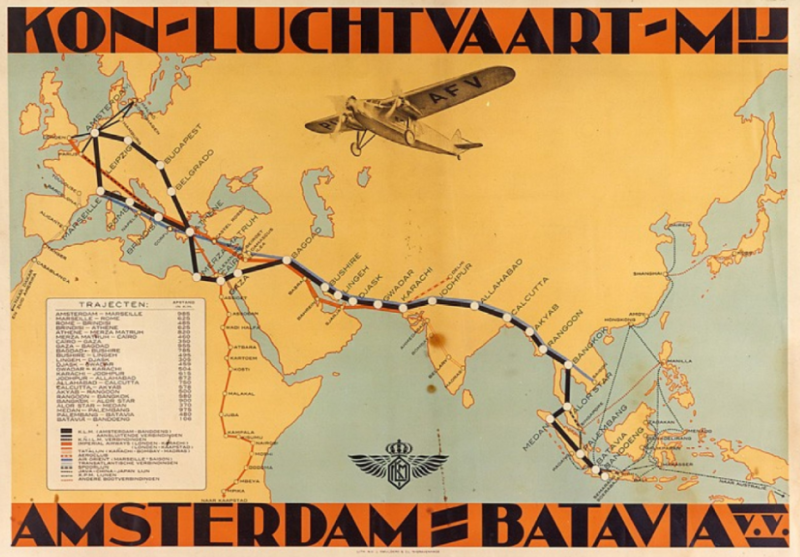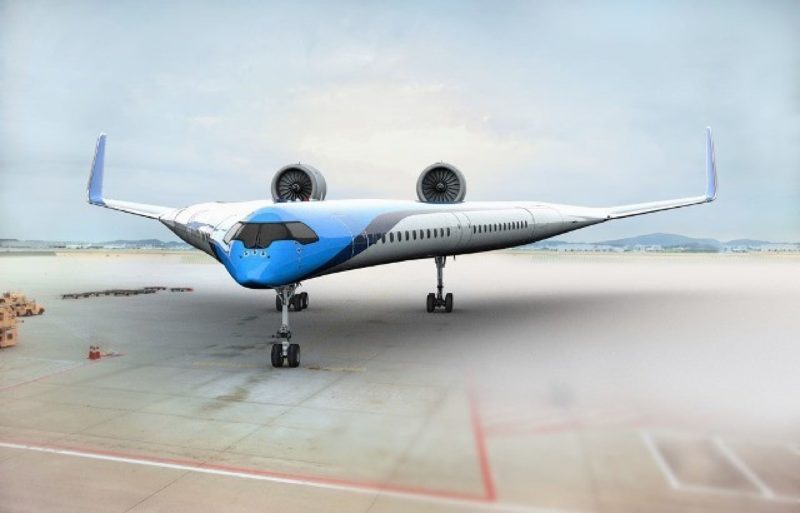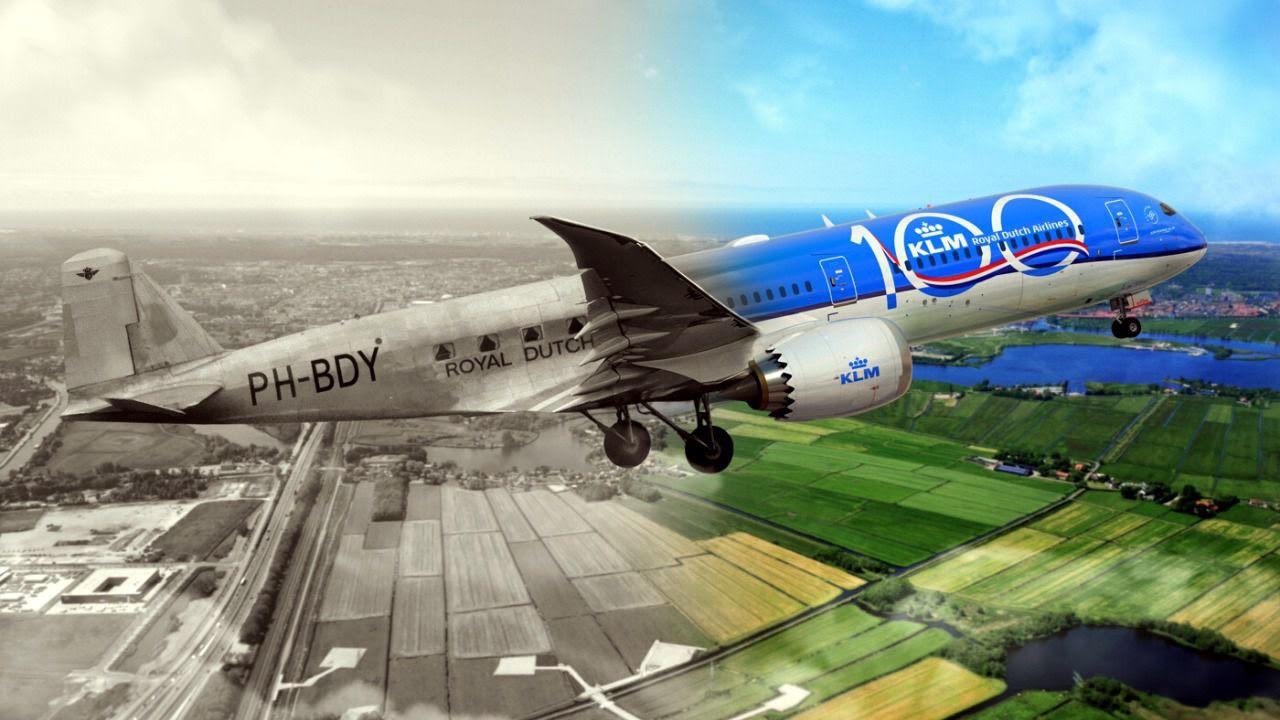KLM Royal Dutch Airlines was founded in 1919. KLM is the oldest airline in the world, still operating under its original name. The airline today celebrates its 100th birthday. Join us in looking back at the monumental events that took place during a century KLM.
Key Milestones for KLM
7th October 1919 – Establishment
Founded on the 7th October 1919, KLM (or the Royal Dutch Airlines) was established by eight Dutch businessmen and was first managed by a young aviator lieutenant named Albert Plesman.

17th May 1920 – First Flight
The first flight took off 7 months after KLM’s establishment. Operated by a leased DeHavilland DH-16, the first flight was from London to Schiphol; carrying two journalists, a letter from the Mayor of London and a stack of newspapers.

1st October 1924 – First Intercontinental Test Flight
The first intercontinental flight from Amsterdam to Batavia (now Jakarta in Indonesia) was operated by a small, single-engine Fokker F.VII. With 3 men on-board, it flew 127 hours over 55 days to reach its final destination. According to scmp, it was later dismantled and sent back to Netherlands by sea.

25th September 1930 – Regular Flight between Amsterdam and Batavia (now Jakarta) Commenced.
Initially only one flight per week was operated; this later gradually increased to three flights per week, back then this was the longest line connection in the world until World War II. Each way took five and half days to complete.

1935 – Introduction of Cabin Crew
The first batch of cabin crew were all male. After World War II, a group of ladies joined. Initially the cabin crew were “on board engineers” apart from their technical duties, passenger care was also included in their responsibilities.

21st May 1946 – Start of Service Between Amsterdam and New York
Operated by a Douglas DC-4, KLM was the first airline to connect mainland Europe and America. This was also the first KLM service to the west.

1st April 1958 – Introduction of Economy Class
Although it was a cabin class lower than the Tourist Class, the service level was kept as high as possible; the introduction of Economy Class made travel more affordable. KLM saw a 27% jump in passenger numbers in three months, following the introduction of Economy Class.

1st November 1958 – Via the North Pole, From Amsterdam to Tokyo
Initially launched in December 1951, the Amsterdam – Tokyo flight flew via the North Pole from November 1958 onward. The crew had to be specially trained for this flight. There were extra provisions on-board, such as polar suits.

25th March 1960 – The Start of the Jet Engine Era
The Douglas DC-8, a 4 jet engine aircraft, made its first landing at Schiphol on 25th March 1960. From then on, flights no longer took days. This aircraft would cut flying time to New York in half.

28th April 1967 – Schiphol Centre, the Homebase Airport for KLM
Schiphol was designated as the homebase, it was further developed so that aircraft could land in strong winds and from all directions.

31st January 1971- First Boeing 747 landed in Schiphol
This B747-206B marked the beginning of KLM’s ‘widebody’ era. On the 14th February 1971, this B747 made her first commercial flight to New York.

27th March 1977 – Tenerife Accident
On this day, a Pam Am B747 and KLM B747 collided in Tenerife airport, causing 583 fatalities. No one survived from the KLM flight, whilst there were 61 survivors from the Pan Am aircraft.

1979 – Introduction of Business Class
This Business Class Service was first introduced in 1979, designated for business travellers. It first started out on the North America routes.

1991 – Beginning of KLM Cityhopper and Loyalty Program
Serving the regional routes, KLM Cityhopper was formed as a result of a merger between NLM Cityhopper and Netherlines in April 1991. Later in December 1991, KLM introduced its first loyalty program; named the “Flying Dutchman” this would later be renamed to “Flying Blue” in 2005.

29th June 1996 – First KLM Flight to Beijing
More than 10 years after China adopted their Open Door Policy, KLM marked its first flight to Beijing on the 29th June 1996. This was the first Chinese destination that KLM flew into.

5th May 2004 – Foundation of Air France-KLM
On this date, both airlines formally formed Air France-KLM. This merger resulted in the largest airline group at the time. It was reported to have led to an annual saving of between €400 million and €500 million. Air France – KLM later formed their combined loyalty programme “Flying Blue” on June 6th 2005.

September 2004 – Joining of Skyteam
KLM formally joined Skyteam on this date. This is an international alliance of airlines made up of 29 airline members.

2nd June 2008 – Last Paper Ticket Issued
From then on, all KLM tickets went digital. This not only saved on paper but also vastly improved efficiency.
14th November 2015 – KLM Received Their First Boeing 787-9 Dreamliner
A revolutionary aircraft aimed to compete with Airbus A330 and A350, the light weight material and efficient engines could help KLM save up to 30% on fuel.

The Future
Flying V – KLM’s Sustainable Future

KLM and TU Delft are working together on a new aircraft, the Flying V; a very energy efficient aircraft designed for long distances. This aircraft design, where the passenger cabin, cargo deck and fuel tanks are integrated into the wing, uses 20% less fuel than the Airbus A350, one of the most modern aircraft of today, due to a better aerodynamic shape and lower weight.
The global airline industry is accountable for approximately 2.5% of all CO2 emissions. KLM announced that it would be investing in constructing a new plant for sustainable aviation fuel (SAF). The SAF production facility will be built in Delfzijl and is expected to be operational by 2022.
Sources: Business Traveller, KLM, SCMP, EAEC, Wikipedia, Ebay


